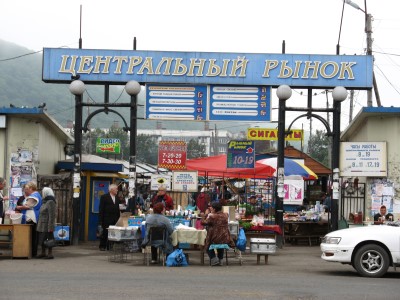
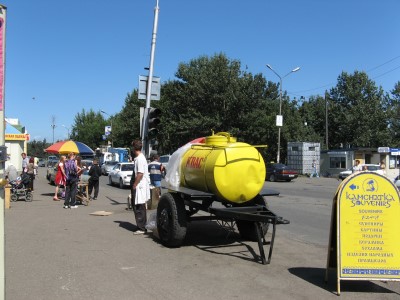
What a wonderful world
At last it was time to check in
for our flight
to Petropavlovsk-Kamchatski. This time, our excess baggage cost ‘only’
7000
Rouble – a special price. When boarding the plane, one could still
recognize
where the Soviet flag – with hammer and sickle – had been on the body.
Somehow,
the Russian markings seemed temporary. When we were settled in the
plane, the
departure time passed without anything happening. We couldn’t
understand the
Russian announcements, and the crew’s English pretty poor. About two hours later, we
finally rolled onto the runway and
the Iljushin – which was full almost to the last seat – set course in
the
direction of the far east of Russia, to Kamchatka. The flight was to
take 8
hours. The time difference to Central Europe is +11 hours.
While
still in Germany,
we had told Martha that we would arrive in Petropavlovsk on 4 August,
at about
10.10 hours
When Martha picked us up at the
airport, she
told us that she had actually expected us the previous day. At first,
we said
we were sure we had not made a mistake and had arrived when we said we
would.
Later, we noticed that we had, in fact, miscalculated by a day. It was
already
5 August and not, as we thought, the 4th of August. So for
then, we
could only go for a short walk through Jelizovo.


That was why we caught the bus
to Milkovo the
next day. The next morning, we were very nervous - the bus was to leave
at 9.30
hrs, and our watches showed 9 o’clock. However, it was really only 8
a.m. – we
had set our watches incorrectly the previous day. Martha’s husband took
us –
complete with all our luggage – to the bus station. Although we speak
almost no
Russian and he spoke just as little English, we managed to communicate
– using
hands and feet. He bade us farewell with a hearty embrace.
Unfortunately, we had to
disappoint the old
woman who wanted to start a conversation with us while we were waiting
for the
bus. We couldn’t understand her. Our fears that we would not recognize
the right
bus proved unfounded – our knowledge of the Cyrillic letters was enough
for
this. A bigger problem was to find a place for all our luggage. What
didn’t fit
in the luggage compartment of the bus had to go in the aisle.
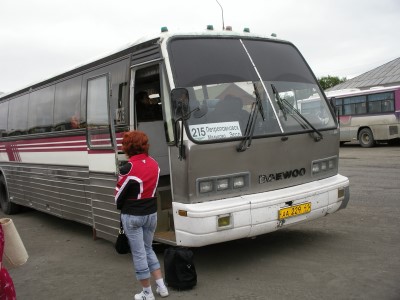
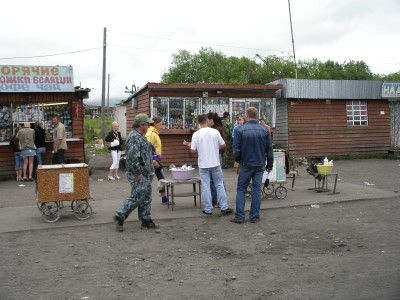
The journey to Milkovo took
about four hours.
The first 100 kilometres, and the last thirty, of the road are surfaced
–
between these, there is a dry dust track, on which people drive and
overtake at
breakneck speed. One can see oncoming traffic fairly soon – as a cloud
od dust!
Milkovo is not directly on the
river, but 10 –
20 km further. I noticed that we crossed the bridge over the Kamchatka,
but our
Russian was not good enough to tell the bus driver that we wanted to get out there.
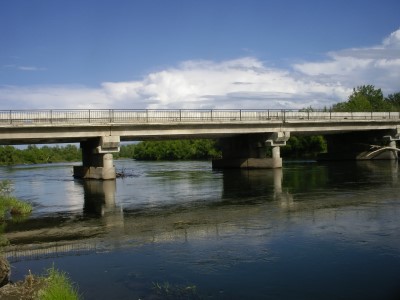
That was why, a few minutes
later, together
with all of our luggage, we were standing in the centre of Milkovo.
Here, there
was a small supermarket (Магазин) and a ‘pub`, of the old Soviet
type. But how could we get to the river?
Somehow, we managed to make two
men who had
been on the same bus as us understand where we wanted to go. They
stopped a car
(a Lada) and, in a lot of words, explained our problem to the driver.
After a
look at our luggage, he said he would have to see his friend, but he
would be
back in about a quarter of an hour and would help us.
We stood there and hoped that we
had understood
everything correctly. It was rather hot that afternoon and the little
old lady
(Бабужка) who was looking after the pub and the toilets took good
care of us.
After about 20 minutes, two cars
did in fact
come. We loaded all our luggage into them. Annette got in one car, I in the other, and
we drove back to the bridge over
the Kamchatka. On the bridge, there is a traffic police checkpoint,
where all
cars are stopped and controlled. We turned off the road before this and
drove
in the direction of the river bank. There we unloaded our luggage,
thanked our
helpers in our rudimentary Russian, plus a few rouble notes.
Our helpers had only just
vanished, leaving us
alone by the river, when the ‘arm of the law’ – which had, of course,
observed
the whole procedure, appeared and wanted to see our papers. Our
passports,
visas, and registration forms were all in order, and the police asked
us about
our plans, which we tried to explain to them. As the boats had not yet
been put
together, we
could only explain very
roughly.
After the tent had been set up
and our things
stowed away, Annette made herself comfortable in the tent and I started
to
assemble the boats. I succeeded in doing so quite easily and quickly.
The
stinging, biting and sucking insects of Kamchatka soon proved that they
were
specially obnoxious and mean. Some of the beasts repeatedly managed to
get
under the mosquito nets. In the first few hours, I killed hundreds of
them, but
there still seemed to be just as many. We had refrained from bringing
anti-mosquito spray and relied on the mosquito nets. This is a mistake
in Kamchatka.
In
the course of the afternoon, a young woman
came by and wanted to sell us fish. I felt that, under the Milkovo
bridge,
there was little danger of bears. However, when she came back, the
promised
fish turned out to be caviar. Much as we like fish, neither Annette nor
I like
caviar, but it was not easy to make Russians understand this. For them,
caviar
is the greatest. They even throw the fish away. I had difficulty
explaining to
the woman, Tanja, that – although I would have liked fish, I definitely
did not
want caviar. She had only caviar, so there was no sale.
In the meantime, the weather had
become sultry
and thundery. The mosquitos were becoming more and more of a problem. I
had to
take refuge in the tent, so there was nothing to eat that evening.
During the
night, and the next morning, it was raining. We decide to remain ‘in
the care
of the police’ for another day. My arms and legs were badly swollen and
burning. In the course of the day, we packed most things in the canoe
bags. As
we also had our backpacks, we also had to find room for these in the
boats.
The next morning – just as I was
getting
breakfast, an older police officer came and invited us to have tea, or
coffee,
with him. I told him we would come later. However, our ideas of time
seemed to
differ. While we were eating breakfast in the tent (because of the
mosquitos),
he came again. We took our pictorial dictionary and our phrase book
with us. I
also put our passports in the inner pocket of my fleecy jacket. We were
given a
very warm
welcome and we tried to make ourselves understood in one way or
another. While drinking coffee, we all decided that our phrase book
(picture
dictionary) was useless. But somehow we managed – using hands and feet.
After
the police had kindly provided us with anti-mosquito spray, we finally got on with packing.
By about 12.30 hrs, we had
everything stowed in and on the kayaks. One could say these were
‘heavily
loaded’.
When I pushed Annette’s boat
into the water, I
found that the water soon became very deep, so I had to turn my boat
round and
get in with it against the current. When I was sitting, I remembered
that the
fleecy jacket was lying behind me, so I threw it down between my legs.
Here,
the river flowed rather fast – a measurement, using GPS, gave a speed
of ca. 7
– 8 km/h. This meant that, using the paddles, we reached a speed of 10
– 11
km/h. The bears that Annette thought she had seen were not visible with
our
binoculars. Perhaps they had already moved on. The otter or beaver
which was
swimming, against the current, near the bank was too fast for us to
follow it
with the glasses.
In places, the river surged and
gurgled around
tree trunks, branches and other obstacles in the water. One had to
watch out
like hell! The current was rather strong.
On some of the sandbanks, we saw
men fishing
from rubber dinghies. From the river, one couldn’t see the houses of
Milkovo,
but the smoke plume from the coal-fired power plant accompanied us for
several
hours. The next, and last, bridge over the Kamchatka isn’t until
Dolinovka.
Gradually, we became accustomed to the rhythm of the river. Here,
obstacles
could be heard from quite a distance away. However, the river demanded
one’s
continuous attention. Where had I already read something similar? Oh,
yes, in a
description of the Yukon River, on which I took a trip in 1997. But, at
that
time, the Yukon was running so little water that there was no danger.
On a
sandbank, where we took a short break, we saw the first bear tracks –
but there
were no signs of bears. Well, we didn’t want to frighten them, and we
were not
particularly anxious to have to get off to a quick start.
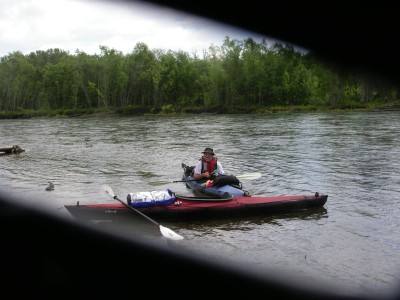
On a gravel bank in a right
bend, I get too far
into the shallows. The current drags the boat over stones. That can be
dangerous in a collapsible boat. I certainly can’t do with a hole in the skin of
the boat just now. I have to get
out, in order to get the boat into deeper water again. When I’m sitting
in the
boat again and can breathe freely, I notice a lot of driftwood, coming
directly
towards me. I was just one stroke of the paddle too late. The boot
tilts, and
then capsizes. As I do not have a spray-cover, I more or less fall out
of the
boat. Coughing and spluttering, I come to the surface again and try to
swim out
of the main current, to the bank. Breathing heavily, I manage to grasp
a branch
and to pull myself – hand over hand – towards the bank. It is about
15.15 hrs.
A fisherman who saw me asked something and I answered ‘yes’, then he
paddled
on. I stand there. I have no idea where Annette is at this moment. I
only know
that she was in her kayak, in front of me. I wait. Was my boat pressed
down
under the wood? I can’t see it anywhere. The river divides into two
arms here.
Which is the right one, down which did Annette continue to paddle?
At about 16 hrs, I made a
decision – which
turned out to be the wrong one – and followed the left arm of the
river. This
afternoon must have been a big feast for the mosquitos. While walking,
I
remembered that our passports were in my fleecy jacket. Oh hell!
Without papers
in a country like Russia! At about 18 hrs, I met a fisherman, who
explained to
me that I had gone the wrong way. First, he took me in his boat to the
other
bank, then to where he hid his boat in the woods. After that, he took
me in his
car to the police in Milkovo.
There, after several telephone
calls which I
could not understand, the fishery inspector was contacted – and he took
it into
his hands to continue the search. Luckily, he spoke English reasonably
well. By about 8 p.m., the large
rubber boat
had been inflated, the outboard motor mounted and adjusted, so we could
put the
boat into the water. Now, with very different light conditions, it was
not too
easy to find the place where I had capsized. Suddenly, on another
gravel bank,
we saw Annette’s boat pulled up – but there was no sign of Annette. The
fishery
inspector and I got out, the others carried on. Then the fishery
inspector
discovered a group of three persons on the opposite bank and directed
the boat
to them. A little later, they returned – with Annette (and my boat). I
was
extremely happy to see Annette again.
This is my description of what
happened. Read
Annette’s version, as written in our travel diary, and compare them:
‘I saw that Reinhold had drifted
too far in the
direction of the sandbank and had problems in getting back into more
rapidly
flowing water. However, I was in the main stream, so it was impossible
for me
to do anything without the risk of capsizing. In front of me was an
enormous
log barrier, which reduced the river to a third of its width, dammed
it, and
made the current extremely strong. Directly behind the logs, I paddled
into the
backwater and waited for Reinhold. But he didn’t come, so his problem
must have
been relatively serious. After some time, I got out, grabbed hold of my
bear
bell and wanted to walk along the sandbank. Just at that moment,
Reinhold’s
capsized kayak drifted along in the main stream. I panicked –
immediately, I
jumped into my boat. The first attempt to push off failed (I was on a
sandbank).
Out of the boat, drop the fleece and the bear bell, a new attempt to
start and
follow Reinhold’s boat. This time, all went well – three hundred metres
down
stream, I succeeded in getting hold of Reinhold’s boat and pushing it
in the
direction of the bank. In desperation, I tried to turn it over. My
spray-cover
was open and in no time my boat was full of water. I couldn’t prevent
it from
capsizing. Getting out was quite easy but the current forced me under
Reinhold’s kayak. I managed to dive under the boat and pull myself – on
branches – towards the bank. The fisherman, who had seen Reinhold, came
by in a
rubber dinghy. I had to swim the last three metres to the bank. The man
pulled
Reinhold’s boat out of the river, together, we pulled it up onto the
bank and
emptied it. (…)
Further up the river, we could
see a red boat
and men – was this help? The boat came up to us, there were men in
uniform on
it, we loaded our gear onto the boat and it started. In the boat, the
police
officer said ‘your husband is alive’ and then he was standing there on
the
sandbank. (…).’
By the time that first our gear
and then we had
been taken back to Milkovo, an interpreter was waiting. We were given a
room in
the Dolina Hotel for the night. On the way to the hotel, we had a short
tour
with the Lenin Memorial and the ‘Street of Victory’. After we had
checked in,
the interpreter ‘organized’ some bread, cheese and beer from the
supermarket
next to the hotel. However, we didn’t sleep much that night – the shock
was
still too deep-rooted
in us.
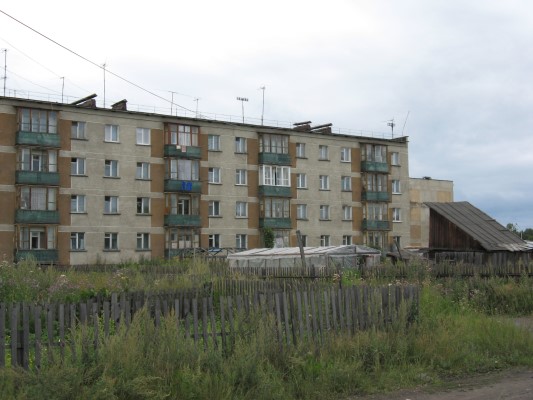
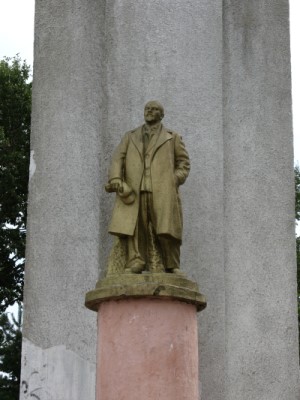
The next morning, at ten
o’clock, we were
picked up by our interpreter Michail. Again we went to the fishery
inspector.
The search for my fleecy jacket - and the passports – had been
unsuccessful.
The inspector took a break from
his work in order
to go with us to the local history museum, so we did not become bored
with
having to wait around. The guided tour there was in Russian, using a
pointer,
and Michail translated into English. Among other things in the museum,
there
was the office of the kolchose director – with a picture of Stalin on
the wall.
Then we went back to the office, the long wait got on our nerves. As
both
cameras had also got water in them, we wanted to look for replacements
in
Petropavlovsk. Also, Martha had copies of our passports there. So we
took the
twelve o’clock bus (which was luckily a bit late) to Petropavlovsk.
On
arrival in Petropavlovsk, we first wanted to
phone Martha. We soon found a public telephone – but it only worked
with a
telephone card. Only after a longer search were we able to buy a
telephone card
in a kiosk and, after several attempts, we also managed to use it to
call
Martha.
After we had told Martha our
story, she first
made several phone calls. She explained to us that it was essential
that we
went to certain offices the next day, and that, until now, we had been
extremely lucky. In Russia, papers are still very important. From her,
we
learned that two Germans who had capsized on the Avancha River had been
flown
back to Germany immediately. But we were still there and we wanted to
go back
to the river, because the second part of our river trip – from
Kozyrevsk to
Ust-Kamchatsk, with our guide Slava – was to start on 16 August.
The next day, our first visit
was to the Lost
Property Office in Petropavlovsk. Martha had arranged for us to have an
interpreter – and we must admit that, without her, we would have been
rather
helpless. With the certificate confirming our loss, we then went to the
Passport and Visa Office. However, it was not possible to go there the
same
day, as the Lost Property Office, a minute cubby-hole with bars, behind
which
there was a man in uniform – instead of a watchdog, he had a watchcat –
was only open from 17 – 18 hrs daily. The Confirmation of Loss was ca.
10 x
10cm in size and cost us 100 Rouble. The visit to the Passport and Visa
Office
- with Lena, the manager of Diligans, the next day – was not so
pleasant at
first. We were threatened with an earlier return home, as Lena tried to
explain
to us (in Russian) and our interpreter in English. After that, we were
rather
discouraged. However, that evening we received the news, from Martha,
that it
would be possible for us to stay until 3 September, as planned. We then
decided
to phone the German Embassy in Moscow that evening. They promised to
issue us
with replacements for our passports, and to handle all the formalities
necessary for leaving the country again. We were told that we should
have new
passport photos taken as soon as possible and, when the promised
application
forms arrived, we should complete these and send them – together with
the
photos – to the German Embassy in Moscow.
On Saturday morning, we had the
photos taken,
filled out the passport application forms and sent them, by Express
Post, to
Moscow. The post office clerk kindly wrote the address of the Embassy
and our
address on the envelope, in Cyrillic script.
That afternoon, we phoned
Michail in Milkovo
and asked him to book a room for us at the Dolina Hotel. When we
arrived in the
evening, he picked us up at the bus-stop and took us to the hotel. This
time,
we didn’t have a ‘luxury’ room, but it cost only half as much, and was
absolutely in order.
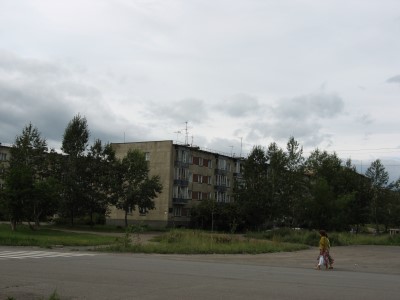
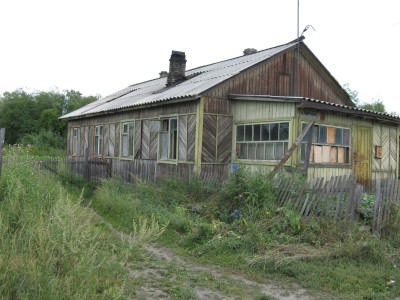
As neither the fishery inspector
nor his
assistants could be reached on a Sunday and our gear was stored in the
garage there,
we spent the Sunday in Milkovo, sleeping and going for walks. On Monday
morning, we visited the fishery inspector again. Our passports had not
been
found while we were away. Luckily, we had – together with Martha – made
all the
necessary arrangements. While I packed the boats, Annette got copies of
the
original reports from the fishery inspector and the police. When it was
almost
half past eleven, we had to put a move on, in order to catch the bus to
Kozyrevsk, which left at twelve. However, the bus didn’t actually leave
until
after one and, to make place for our ca. 100kg of luggage, two of the spare tyres
had to be left behind. Shortly
before we left, the police office Sergej passed by to wish us a good
trip.
About 35km from Milkovo, there
was a bump and
one could hear one of the tyres burst. The bus driver ignored the sound
for the
next 10km but, on reaching the downhill stretch, both drivers got out
and the
way in which they frowned showed that they had no choice but to change
the
tyre.
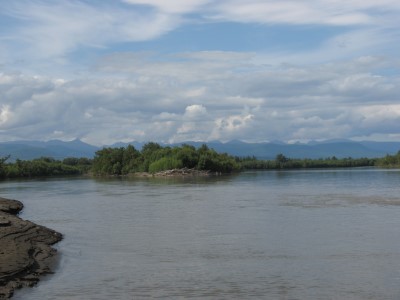
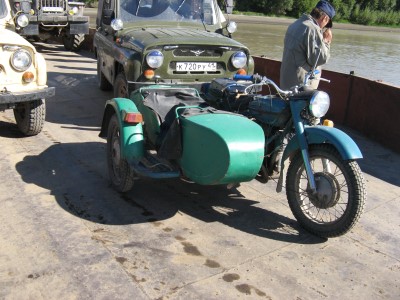
Just before Kozyrevsk, the
Kamchatka had to be
crossed by ferry. Busses had to reverse onto the ferry, so they could
drive off
forwards. We arrived in Kozyrevsk at about 17.45 hrs. Af first, we had
no
success in finding someone to take us and our gear to the river.
Somebody had
promised to come by on a motorbike but, after waiting for half an hour,
I made
my way – with Annette’s boat – in the direction of the river. About 1
km. When
I was making my third trip – while Annette waited at the bus-stop, a
motorbike
with a sidecar pulled up, and the rider asked her where we had got to.
He took
Annette, plus the remaining luggage, down to the river, where I was
already
starting to set up the tent on the bank. The farmer who had picked up
Annette
suggested that we put the tent up in his garden, and we gladly accepted
his
invitation to tea. We refused the caviar that we were offered but
enjoyed the
dried salmon. It is impossible to make Russians understand that we
don’t like
caviar. After he had opened the second bottle of home-brew, we tried to
leave
in the direction of our tent. As a woman, Annette could politely
decline. My
guess is that the home-brew contained at least 60% alcohol. It also
contained
some kind of herbs in it. I couldn’t manage more than one glass. The
farmer couldn’t
really understand that, and it was difficult for me to explain
politely. But it
was also a lesson in Russian hospitality, which we were to experience
repeatedly and which caused us to have a ‘guilty conscience’ for a
while.
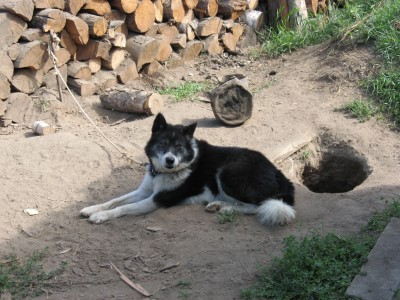
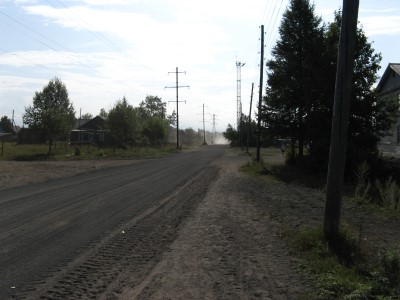
The next day, I put our boats
together again.
The unanimous comment of all passers by was: no motor and far too small
for the
great river. On hearing our destination, they laughed knowingly.
Luckily, we
could not understand most of the remarks and commentaries. Some of
these were
certainly not flattering.
to the third part of our Kamchatka trip